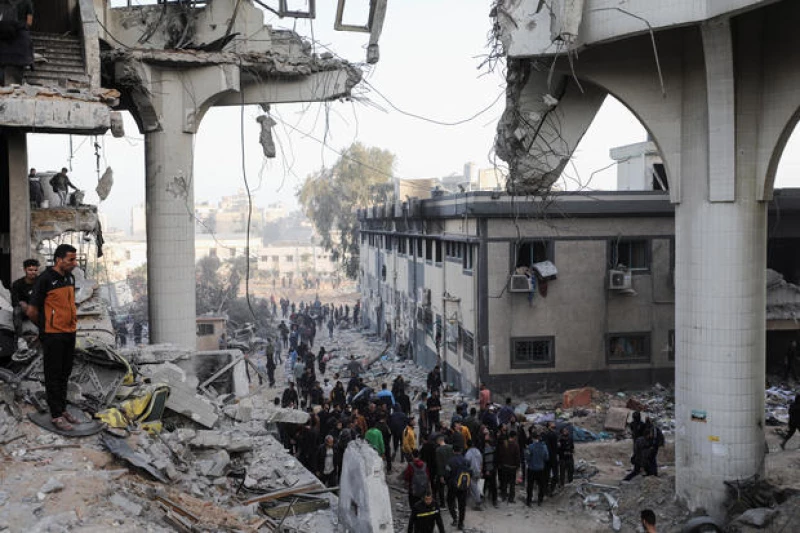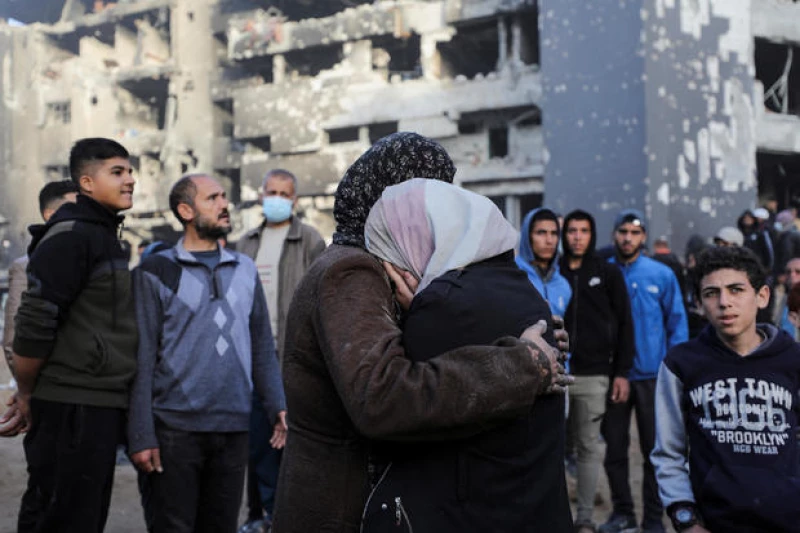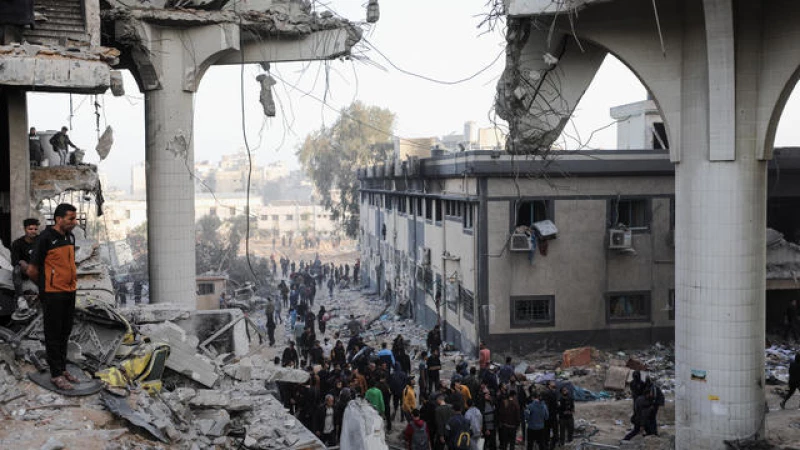Deir al-Balah, Gaza Strip — After a two-week raid, the Israeli military has withdrawn from Gaza's largest hospital, leaving behind several bodies and a vast swath of destruction, as reported by Palestinian residents.
The military has labeled the raid on Shifa Hospital in downtown Gaza City as a highly successful operation in the ongoing war. It claims to have eliminated numerous Hamas and other militants, including high-ranking members, and to have confiscated weapons and valuable intelligence. The military has confirmed the withdrawal of forces on Monday.
"Troops have concluded precise operational activities in the vicinity of Shifa Hospital and have exited the hospital area," stated the military, as reported by Agence France-Presse.
The U.N. health agency has reported that several patients lost their lives and many others were put in danger during the raid, which caused further devastation to a hospital that was already struggling to function.
Days of intense fighting have demonstrated that Hamas is still capable of putting up a fight, even in one of the most heavily impacted areas of Gaza.
Mohammed Mahdi, who was among hundreds of Palestinians who returned to the area, described a scene of "total destruction." He said several buildings had been burned down and that he had counted six bodies in the area, including two in the hospital courtyard.
Video footage circulating online showed heavily damaged and charred buildings, mounds of dirt that had been churned up by bulldozers and patients on stretchers in darkened corridors.
Another resident, Yahia Abu Auf, said there were still patients, medical workers and displaced people sheltering inside the medical compound after several patients had been taken to the nearby Ahli Hospital. He said army bulldozers had plowed over a makeshift cemetery in Shifa's courtyard.
"The situation is indescribable," he said. "The occupation destroyed all sense of life here."
Israel has accused Hamas of using hospitals for military purposes and has raided several medical facilities. It says it launched the raid on Shifa after Hamas and other militants had regrouped there. Health officials in Gaza deny those allegations.

Critics accuse the army of recklessly endangering civilians and decimating a health sector already overwhelmed with war-wounded. Palestinians say Israeli troops forcibly evacuated homes near the hospital and forced hundreds of residents to march south.
At least 21 patients have died since the raid began, World Health Organization Director-General Tedros Adhanom Ghebreyesus posted late Sunday on X, formerly Twitter.
Reports indicate that there are still over a hundred patients inside the compound, including four children and 28 critical patients. The dire situation is exacerbated by the lack of diapers, urine bags, or water to clean wounds, with many patients suffering from infected wounds and dehydration.
Previously, the military had raided Shifa Hospital in November, claiming that Hamas had a command center both inside and beneath the compound. While a tunnel was discovered running beneath the hospital leading to a few rooms, the weapons confiscated did not match the scale of what was alleged prior to the raid.
The conflict began on Oct. 7, with Hamas-led militants entering southern Israel, resulting in the deaths of approximately 1,200 people, mostly civilians, and the hostage-taking of around 250 individuals.

In response, Israel launched an air, land, and sea offensive that has led to the deaths of at least 32,782 Palestinians, according to Gaza's Health Ministry. The ministry's count does not differentiate between civilians and combatants but notes that women and children account for about two-thirds of the casualties.
The Israeli military claims to have eliminated over 13,000 Hamas fighters and attributes the civilian death toll to Palestinian militants operating in densely populated residential areas.
The ongoing war has resulted in the displacement of most of the population and pushed a third of residents to the brink of famine. Northern Gaza, where Shifa Hospital is situated, has faced extensive destruction and isolation since October, leading to widespread hunger.
In a recent statement, Israel declared that it had mostly dismantled Hamas in northern Gaza and pulled back thousands of troops. Despite this, there have been multiple clashes with militants in the region since then.
Israeli Prime Minister Benjamin Netanyahu has made a commitment to continue the offensive until Hamas is eradicated and all hostages are released. He has announced plans to extend ground operations to the southern city of Rafah, where over half of Gaza's population, around 1.4 million people, have taken shelter.
However, Netanyahu is facing increasing pressure from Israeli citizens who hold him responsible for the security lapses on October 7th. Additionally, some families of the hostages are blaming him for the failure to secure a deal despite weeks of negotiations facilitated by the United States, Qatar, and Egypt.
It is known that Hamas and other militant groups still have around 100 hostages and the remains of 30 others in their custody, after releasing most of the captives during a ceasefire last November in exchange for the release of Palestinian prisoners held by Israel.
Over the weekend, tens of thousands of Israelis gathered in central Jerusalem for the largest anti-government demonstration since the conflict began in October. The divisions regarding Netanyahu's leadership have been deep-seated long before the war, although he still maintains considerable public support.






